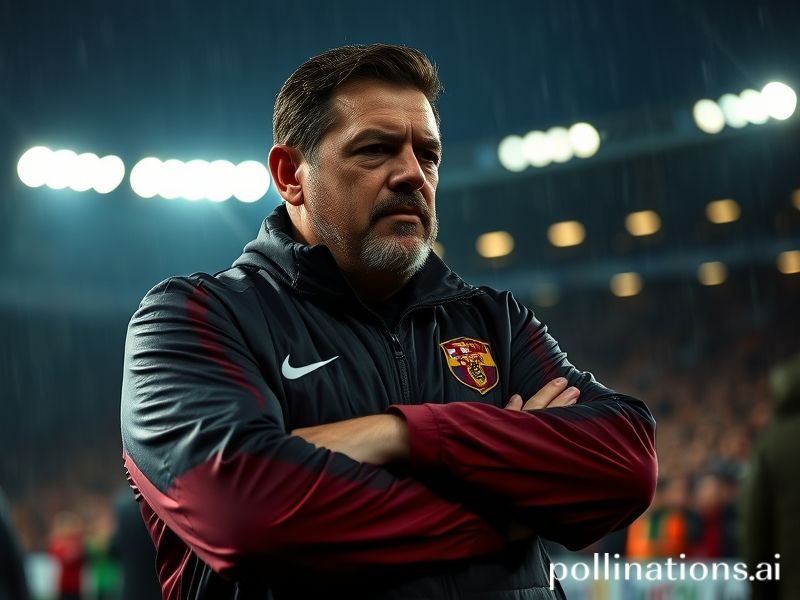Rafa Benítez: Global Football’s Last Tactical Nomad Stays One Step Ahead of the Creditors
Rafa Benítez: The Last Managerial Nomad Still Searching for Wi-Fi in the Desert of Modern Football
By our man in the departure lounge
It is a truth universally acknowledged that a single man in possession of a Champions League medal must be in want of a new employer every eighteen months. Enter Rafael Benítez, the Spanish football strategist who has become the Marco Polo of touchline tourism, currently unpacking his tactical scrolls at Celta Vigo after a nine-month sojourn in the Everton hot seat—an appointment as warmly received on Merseyside as a tax demand in Latin.
From a global vantage point, the Rafa Roadshow is less a career arc than an annotated atlas of geopolitical anxiety. His passport reads like a fever dream of late-capitalist restlessness: Madrid, Liverpool, Valencia (twice), Naples, the North-East of England (twice), China, and now the wind-lashed Galician coast. Each stop supplies the same plot beats—initial optimism, a burst of clean-sheet pornography, mutiny over zonal marking, and a tearful airport press conference. The only continent missing is Antarctica, presumably because penguins are notoriously resistant to a 4-2-3-1.
The international significance? Simple. Benítez is the last manager who still believes a football club is a living thesis rather than a content farm. In an era when super-agents conduct transfer policy via Instagram DM and Saudi sovereign wealth is measured in Neymars, Rafa clings to the archaic notion that data, diet, and diagonal balls can still overcome petrodollars. Admirable, yes—like watching a lighthouse keeper insist the shipping lanes still matter while tankers reroute around him on autopilot.
Consider his Chinese interlude at Dalian Professional. Western observers treated it as football exile; Chinese executives sold it as “European IP transfer.” Both missed the point. Benítez was trying to build a football academy that didn’t double as a money-laundering hashtag. The project collapsed when the real-estate conglomerate funding it went bust—because nothing says globalized sport like a manager sacked by the bond market. He left behind a PowerPoint on pressing triggers and an unpaid electricity bill, a microcosm of modern soft-power diplomacy.
Now at Celta, he inherits a squad whose wage bill is roughly the catering budget of Manchester City’s analytics department. Yet expectations remain nuclear. Vigo’s seafood restaurants buzz with talk of Europa League coefficients, as if the cure for regional unemployment is a Thursday night in Sofia. You can almost hear the ghost of Galician bagpipes whispering: “Give us this day our daily clean sheet.”
Meanwhile, the wider world watches with the detached amusement of a barfly observing someone order a kale martini. Premier League pundits label him “past it,” which in television years means anyone who still uses email. Gulf-state investors, those connoisseurs of heritage rebranding, see him as an undervalued asset—plug Rafa into a project, harvest credibility, flip before the fan forum turns feral. Even the MLS has begun circling, presumably attracted by the irony of deploying a man famed for defensive rigor in a league where matches finish 5-4 because someone’s sprinkler system is on the fritz.
But here’s the cosmic joke: Benítez keeps landing jobs precisely because chaos is now the default setting. Modern clubs are less sporting institutions than distressed assets in need of a crisis manager who speaks fluent Excel. Who better than a 63-year-old with a laptop full of heat maps and the haunted eyes of a man who once tried to explain set-pieces to Florentino Pérez?
So we salute the itinerant professor, forever scribbling marginalia on the collapse of European football’s middle class. Somewhere tonight he’s probably reviewing video of a 19-year-old left-back from Montevideo, wondering if the kid can survive both La Liga wingers and the club’s looming insolvency. The game has changed, money has won, yet Rafa Benítez continues to pack his briefcase like a Cold War spy swapping safe houses.
In the end, his legacy may be less about trophies than about persistence: proof that in a sport increasingly run by sovereign wealth and venture-capital mood boards, one stubborn man with a USB stick can still make the world care about the offside trap. And if that isn’t a dark, beautiful joke, I don’t know what is.







